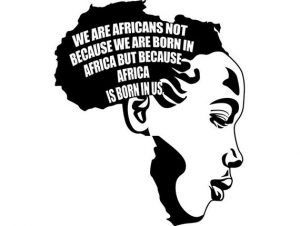Home
Where do I ground my roots?
Where can I plant my feet?
Where shall I rest my head?
A soul untethered, free?
-Alia Wood
From a young age, I’ve always had a contentious relationship with the racial identifier “African-American”. I never understood how that term reflected my identity. I would tell my mother, “Ma, but we’re not African, we’re only American.” I’d hoped that I’d eventually “outgrow” my discomfort with the word, but my relationship with “African-American” only grew to be more tenuous. By birth, I am a Black American, but as I’ve grown I’ve felt as though the America that I live in does not love me enough to make me want to stay. I think of a place in which I will be wholly accepted as a Black woman, a place where the color of my skin does not limit me to a constrictive set of oppressive possibilities, a place where my blackness can be celebrated. Especially after Trump’s election I understood that America was no longer mine, that the majority of people in this country, rather, the dominant forces in this country have made their voices clear they do not want me here. So why should I stay? It is clear that my life does not matter here, so what more to America do I owe? This America Is one that intends to be made white (in domination) again, blatantly oppressive again, openly discriminatory again. This place is not my home and it’s been made clear to me that it never has been.
In 2016, Dr. Ulysses Burley III coined the term “Blaxit”- a mass exodus of Black Americans moving to Africa- taking after Britain’s decision to leave The European Union. He wondered if an entire nation can leave an established union. why can’t blacks leave the U.S. and what would happen if we did. Since the 1800s there have been groups that have advocated for a “back-to-Africa” exodus for Black Americans. One of the most prominent leaders of the “back-to-Africa” movement was Marcus Garvey. Garvey, a Jamaican born leader of the Pan-African movement and black nationalist, was a civil rights activist who advocated for an establishment of independent Black states in Africa, particularly on the west coast of the continent and in Liberia. Garvey once asked: “Where is the Black man’s government? Where is his King and his kingdom? Where is his President, his ambassador, his country, his men of big affairs? I could not find them. And then I declared, ‘I will help to make them.’” Garvey understood that success for the Black race could only come when they were able to positively self-identify as who they wanted to be outside of the realm and constraints of white supremacist structures.
Garvey founded the UNIA, the Universal Negro Improvement Association, in 1914 and it was originally established to provide racial uplift in the form of imparting economic knowledge and education for the Black race. At one point, the UNIA had over 8 million members spanning across the globe. In our contemporary moment, understanding the problems that black diasporic peoples face every day such as poverty; racial discrimination; social, political, and economic exploitation; and perpetual conflict between dominant structures in place and those who are subjugated by those forces, it would be prudent to actively consider the teachings of Marcus Garvey.
Though much progress has been made through the Civil Rights Movement and by civil rights activists, Black people continue to be subjugated by an oppressive white supremacist system that has institutionalized and socialized racism so to limit opportunities and possibilities for the true liberation of Black people. We are not free as we are subject to our identities being formed by a white hegemonic narrative and social structure. We are powerless as we see that the white supremacist structures in place are so invasive that blacks cannot even have power over their own communities- think of redlining, the War on Drugs, and gentrification. Think of police brutality, incarceration statistics, Black unemployment, and poverty. Think of white savior films, cultural appropriation, and erasure and/or silencing of Black narratives. Think about all of these things that are woven into the fabric of America’s identity.
The privileged, dominant class that thrives on these white supremacist ideologies, institutions, and interrelations regardless of our pleas and our protests continue to perpetuate this type of oppressive behavior because they are aware that they have stolen all and any power from us and hoarded it for themselves keeping them as the dominant entity in this country. Let us not repeat history, but rather learn from it and do something to change our destiny. Let us unite and grant ourselves the self-help that Marcus Garvey taught. Where do we belong? We belong somewhere where we are welcome. Africa is the motherland and it is where we belong.

Leave a Reply